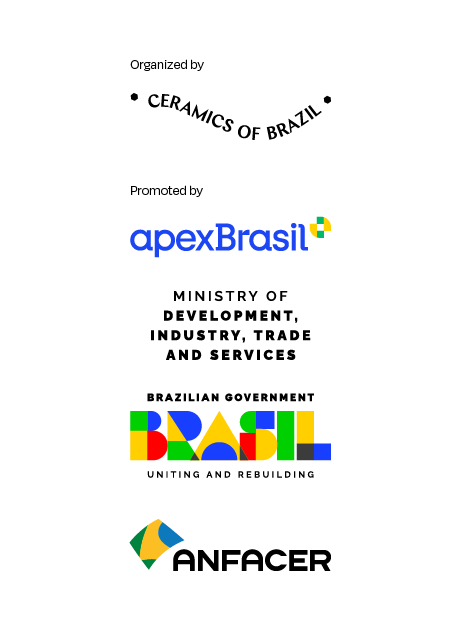
An unprecedented project for the use of biomethane by the Brazilian ceramic tile industry, with the goal of supplying 50% of the energy demand of the São Paulo state cluster by 2030, was presented at COP 28 (United Nations Climate Change Conference) last Sunday, December 3, in Dubai, in the United Arab Emirates. The case was discussed on the panel "De-fossilization from the circular economy: the contribution of biogas to the energy transition in the Global South".
The Brazilian ceramics sector has always been at the forefront of sustainability issues, and is recognized as producing some of the greenest ceramics in the world. The program to replace natural gas with biomethane as fuel for the kilns of Brazilian industries is another step along this path, and is the subject of an agreement between the ceramics and sugar-energy sectors in March 2023. The event took place in Santa Gertrudes, in the interior of the state of São Paulo.
Initially, the pilot project will start operating in 2025, covering ten consumer plants in the manufacturing hub located around the municipality. Nationally, it could also supply factories in Santa Catarina and the Northeast, as well as other segments that could join the energy transition using the same model.
The following organizations are signatories to the agreement: Anfacer (National Association of Manufacturers of Ceramic Tiles, Sanitary Ware and Congeners); APLA (Local Alcohol Productive Arrangement), a technological partner in the project; Aspacer (São Paulo Association of Ceramic Tiles) and Sindiceram (Ceramic Industries Union - Criciúma). The company Geo bio gas&carbon and Senai Nacional are also taking part.
The project was presented at COP28 by Benjamin Ferreira Neto, vice-president of the Board of Directors of Anfacer and Aspacer; Flávio Castellari, executive director of APLA; Isabela Bolonhesi, head of Environment, Sustainability and ESG at Geo biogas&carbon; and Eduardo de Miranda, Director of Business and Entrepreneurship at the Itaipu Technology Park (PTI), with Luciana Furtado, Agribusiness Management Analyst at ApexBrasil (Brazilian Trade and Investment Promotion Agency) mediating.
The program highlights Brazil's potential for the production and use of biogas. According to Abiogás (Brazilian Biogas Association), the country is expected to produce 30 million Nm³/day (normal cubic meter per day) of biogas by 2030. This volume could meet part of the Brazilian demand currently supplied by diesel, around 150 million Nm³/day. Six plants authorized by the National Petroleum, Natural Gas and Biofuels Agency (ANP) to operate have already been established, with a capacity of approximately 450,000 Nm³/day. Today, production capacity is still less than 2% of potential.
A new step in reducing the carbon footprint
Anfacer had already taken part in COP26 in Glasgow, Scotland, presenting a sector project to preserve the environment. "We are pleased to be back at the UN Conference, now with a pioneering project 'made in Brazil'. The transition of the energy matrix will promote sustainability and further reduce our carbon footprint, while processing biogas fuel from organic waste from sugar and alcohol mills. It's the so-called pre-salt from Brazil to the world," says Benjamin Ferreira Neto.
He talked about the gradual use of biomethane in the kilns of the ceramics industry, which is always committed to increasing its level of social and economic sustainability, while respecting the environment. "It's important to remember that, in a decade, our sector, which is a leading player in the global market and produces some of the greenest ceramics in the world, has avoided the emission of 4.6 million tons of carbon dioxide into the atmosphere by using natural gas. Now, with biomethane, we can extend this progress and contribute to the global decarbonization debate," he adds.
Flávio Castellari, executive director of APLA, praises the Brazilian government's decision to recognize the pioneering spirit of the case at the climate conference. He also reiterates the successful union of sectors to discuss the energy transition, plan and show the world that there is a market for new solutions.
"Our partnership was very important because it created a market of more than a million cubic meters of biogas a day, showing the trust that the ceramics industry has placed in the technology and production, with the conditions to supply on a large scale. It's a project that can be decentralized. Wherever there is a plant, we can produce the biogas and distribute it. We are starting to work in other ceramics centers, not just in Santa Gertrudes. We want to show the world that projects like ours are scalable and replicable, since there are more than 100 countries that work with sugar cane on a large scale," says Castellari.
The program demonstrates in practice that it is possible to use sugarcane waste, with cutting-edge and approved technology, to produce biogas on a large scale. The multidisciplinary integration of the players is an example of the fact that, when there is dialog and planning, the energy transition is feasible and finds in Brazil a wealth of opportunities for new businesses.
According to Alessandro Gardemann, CEO of Geo bio gas&carbon, the biomethane project in the ceramics industry is a milestone in the Brazilian industry's transition to a low-carbon economy. "The sector has always been a partner in our country's energy transformation. This initiative raises its competitiveness, bringing it into line with international standards and opening doors for other industrial segments to also adopt solutions that add value and decarbonize their production." For Gardemann, as well as encouraging the circular economy and reducing the impact of greenhouse gas emissions, the use of biomethane by industry and the union of the sugar-energy and ceramics hubs reinforce Brazil's leading role in the use of biofuels.
You can watch the panel on Apex Brasil's YouTube channel at the following link: https://www.youtube.com/watch?v=yg6HO02DeVk
COP28 in the United Arab Emirates will be held until December 12.




